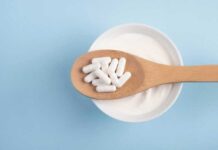
Cholesterol is a waxy substance that your liver produces and is found in your blood. Your body uses cholesterol to make vitamin D, hormones, and other substances to help you digest food. While your body makes all the cholesterol that it needs, you can get added cholesterol from animal sources like meat and dairy products. As a result of eating too much of these foods, you may be at an increased risk of developing high cholesterol.1
Having too much cholesterol in your body can block blood flow, making you more likely to experience serious medical complications such as stroke or heart attack. That’s why knowing how to lower your cholesterol if you have high cholesterol is so important.
Generally, you can treat high cholesterol with lifestyle changes like an improved diet and an increase in physical activity. However, if lifestyle adjustments aren’t helping you get your desired results, your healthcare provider may suggest certain medications to bring your cholesterol levels to a healthy range.2
Adjusting Diet
If you have high cholesterol, your healthcare provider will likely talk to you about your eating habits and meal plans. To help bring your cholesterol down, your provider will usually discuss changing your diet. In some cases, they may also refer you to a nutritionist who may help you develop an eating plan that’s right for you.
A diet best suited for reducing cholesterol consists of:3
- Fruits
- Vegetables
- Fish
- Beans
- Lean meats
- Whole grains
Your healthcare provider may also recommend refraining from:
- Sweets and desserts
- Fatty meats
- Foods high in salt and fats
- Alcohol
- Sugary drinks
The DASH diet may be a good place to start when making dietary changes. DASH is an acronym that stands for dietary approaches to stop hypertension (high blood pressure). This diet focuses on eating foods that are high in potassium, protein, calcium, and fiber while low in salts and saturated fats.4,5
A review of the DASH diet was published in the British Journal of Nutrition in 2015 which studied the effect this diet has on heart disease. Researchers found evidence that the DASH diet may lower blood pressure and cholesterol. While diets aren’t one-size-fits-all, talk to your healthcare provider about the DASH diet and whether this eating plan may work for you.6
Exercising
A lack of physical activity can increase your risk of having high cholesterol. If you have high cholesterol, moving your body more frequently can help bring your levels to a healthy range.
According to the American Heart Association, adults should get at least 150 minutes of moderate-intensity aerobic exercise weekly. Your healthcare provider may recommend the following activities:7
Keep in mind: the above activities are not an exhaustive list of exercises you can complete. The important thing is to find a combination of activities that you enjoy doing and help keep your body active throughout the week.
Managing Weight
Obesity increases your likelihood of having high cholesterol. To reduce your cholesterol levels and reduce the risk of complications, your healthcare provider may recommend managing your weight if you are obese.2
In most cases, they’ll help you achieve any desired or recommended weight loss with dietary changes and an exercise program. Your provider may also recommend stress management techniques to help boost your emotional well-being and help you become more mindful about your food and exercise choices—which may help you lose weight and keep the weight off. These techniques may include meditation, deep breathing, and journaling, among others.8
A Note on Weight Loss
The research cited in this article claims that weight loss can prevent or help treat a chronic condition. An individual’s weight is affected by a variety of biological, environmental, and social factors. Health.com does not promote or condone weight loss that’s not under the care of a healthcare provider. Please contact your healthcare provider if you’re concerned about losing weight responsibly and healthfully.
Reducing Stress
One study published in Medicine in 2017 found that psychological stress was associated with higher LDL (or “bad”) cholesterol and lower HDL (or “good”) cholesterol. That said, identifying your stressors and learning how to manage them may help reduce high cholesterol levels.9
The American Heart Association has several recommendations for stress management. Some of these strategies include:10
- Positive self-talk, such as “I’ll do the best I can” or “I know how to handle challenges”
- Mindfulness and meditation
- Counting to 10 during a stressful situation
- Taking a walk in nature
- Doing yoga
While stress is a part of daily life, having too much stress or feeling unable to manage stressors properly can lower your quality of life and hinder your emotional wellness. In such cases, you may find it helpful to talk to a mental health professional for therapy and added support. While you can find a therapist on your own, you may also consider asking your primary care provider for a referral.
Avoiding Substance Use
Research suggests that quitting smoking can raise your HDL cholesterol. HDL or “good” cholesterol helps reduce LDL or “bad” cholesterol from your arteries—or, blood vessels that transport oxygen and nutrients to your organs and tissues.2
Additionally, drinking too much alcohol can lead to weight gain, which can increase your LDL cholesterol and lower your HDL cholesterol. Healthcare providers recommend that people assigned male at birth should have no more than two alcoholic drinks per day, while those assigned female at birth shouldn’t consume more than one drink per day.3
Taking Medications
Your healthcare provider may suggest cholesterol-lowering medications if lifestyle changes are not enough to help reduce high cholesterol levels. Based on your cholesterol level and overall health, your provider can prescribe one of the following medications:11,12
- Statins: Prevents the liver from making cholesterol and helps lower LDL cholesterol while raising HDL cholesterol. Statin medications are usually safe to use. However, you may experience certain side effects such as muscle weakness, trouble thinking, and an increase in blood sugar. If you have a history of liver disease or are pregnant, your provider will likely not prescribe you statins.13
- Bile acid sequestrants: Blocks bile acid from being absorbed into the bloodstream. This can help to lower LDL cholesterol. Common side effects can include constipation, indigestion, and increased burping.14
- Cholesterol absorption inhibitors: Inhibits cholesterol from being absorbed in the intestines, which can help reduce high cholesterol in your body. You might experience side effects such as diarrhea and joint pain. However, these medications may not be safe for people who are pregnant or breastfeeding.15
- Niacin (nicotinic acid): Niacin, also known as vitamin B3, helps lower LDL cholesterol and boost HDL cholesterol. You can purchase this medication over the counter, but it’s best to consult your healthcare provider before taking the vitamin. Niacin can cause side effects such as cough, skin rash or itching, and an upset stomach. If you have diabetes, proceed with caution before taking this medication as this can also raise your blood sugar.16
U.S. Food & Drug Administration. Cholesterol medicines guide.
- PCSK9 inhibitors: PCSK9 inhibitors block the action of a protein called PCSK9. This protein found in the liver helps to remove LDL cholesterol from your bloodstream. Side effects can include flu-like symptoms, back pain, and difficulty breathing.15
Living With and Managing High Cholesterol
If you learn you have high cholesterol, your healthcare provider can help you develop a treatment plan that is right for you. This may include a breadth of options including dietary changes, an exercise program, stress reduction techniques, and medications.
According to the American Heart Association, your primary care provider may also suggest medications for lowering cholesterol if you:17
- Have a history of heart disease or stroke
- Live with diabetes
- Are 40 to 75 years old and have an LDL cholesterol level of 70 to 189 milligrams per deciliter (mg/dL)
What’s important to know is that being proactive about your cholesterol levels early can help bring them back down to a healthy range. This can reduce your risk of health complications such as heart attack or stroke, and lower your likelihood of developing other health conditions. So don’t wait until it’s too late, and talk to your healthcare provider about what you can do to lower your cholesterol and improve your long-term quality of life.
A Quick Review
High cholesterol occurs when your body has more cholesterol than it needs to function properly. You may be at an increased risk of developing high cholesterol if you eat a high-salt and high-fat diet, live a sedentary lifestyle, and use substances.
The good news: you can bring your cholesterol levels back down to a healthy range with a variety of lifestyle changes and medication.
Sources:
- Centers for Disease Control and Prevention. About cholesterol.
- MedlinePlus. How to lower cholesterol.
- MedlinePlus. How to lower cholesterol with diet.
- National Heart, Lung, and Blood Institute. DASH eating plan.
- Medline Plus. DASH eating plan.
- Siervo M, Lara J, Chowdhury S, Ashor A, Oggioni C, Mathers JC. Effects of the Dietary Approach to Stop Hypertension (DASH) diet on cardiovascular risk factors: A systematic review and meta-analysis. Br J Nutr. 2015;113(1):1-15. doi:10.1017/S0007114514003341
- American Heart Association. American heart association recommendations for physical activity in adults and kids.
- Hansen TT, Astrup A, Sjödin A. Are dietary proteins the key to successful body weight management? A systematic review and meta-analysis of studies assessing body weight outcomes after interventions with increased dietary protein. Nutrients. 2021;13(9):3193. doi:10.3390/nu13093193
- Assadi SN. What are the effects of psychological stress and physical work on blood lipid profiles? Medicine. 2017;96(18):e6816. doi:10.1097/MD.0000000000006816
- American Heart Association. 3 tips to manage stress.
- U.S. Food & Drug Administration. Cholesterol-lowering drugs get labeling changes.
- U.S. Food & Drug Administration. Cholesterol medicines.
- Medline Plus. Statins.
- MedlinePlus. Bile acid sequestrants for cholesterol.
- American Heart Association. Cholesterol medications.
- U.S. Food & Drug Administration. Cholesterol medicines guide.
- American College of Cardiology and American Heart Association. ASCVD risk estimator.
Important Notice: This article was originally published at www.health.com by Alexandria Jones-Patten, Ph.D., RN where all credits are due. Medically reviewed by Rafle Fernandez, MD.
Disclaimer
The watching, interacting, and participation of any kind with anything on this page does not constitute or initiate a doctor-patient relationship with Dr. Farrah™. None of the statements here have been evaluated by the Food and Drug Administration (FDA). The products of Dr. Farrah™ are not intended to diagnose, treat, cure, or prevent any disease. The information being provided should only be considered for education and entertainment purposes only. If you feel that anything you see or hear may be of value to you on this page or on any other medium of any kind associated with, showing, or quoting anything relating to Dr. Farrah™ in any way at any time, you are encouraged to and agree to consult with a licensed healthcare professional in your area to discuss it. If you feel that you’re having a healthcare emergency, seek medical attention immediately. The views expressed here are simply either the views and opinions of Dr. Farrah™ or others appearing and are protected under the first amendment.
Dr. Farrah™ is a highly experienced Licensed Medical Doctor certified in evidence-based clinical nutrition, not some enthusiast, formulator, or medium promoting the wild and unrestrained use of nutrition products for health issues without clinical experience and scientific evidence of therapeutic benefit. Dr. Farrah™ has personally and keenly studied everything she recommends, and more importantly, she’s closely observed the reactions and results in a clinical setting countless times over the course of her career involving the treatment of over 150,000 patients.
Dr. Farrah™ promotes evidence-based natural approaches to health, which means integrating her individual scientific and clinical expertise with the best available external clinical evidence from systematic research. By individual clinical expertise, I refer to the proficiency and judgment that individual clinicians acquire through clinical experience and clinical practice.
Dr. Farrah™ does not make any representation or warranties with respect to the accuracy, applicability, fitness, or completeness of any multimedia content provided. Dr. Farrah™ does not warrant the performance, effectiveness, or applicability of any sites listed, linked, or referenced to, in, or by any multimedia content.
To be clear, the multimedia content is not intended to be a substitute for professional medical advice, diagnosis, or treatment. Always seek the advice of your physician or other qualified health providers with any questions you may have regarding a medical condition. Never disregard professional medical advice or delay in seeking it because of something you have read or seen in any website, video, image, or media of any kind. Dr. Farrah™ hereby disclaims any and all liability to any party for any direct, indirect, implied, punitive, special, incidental, or other consequential damages arising directly or indirectly from any use of the content, which is provided as is, and without warranties.








